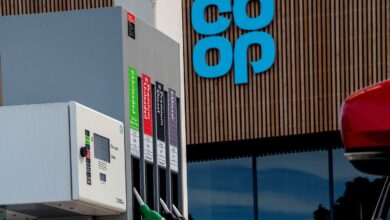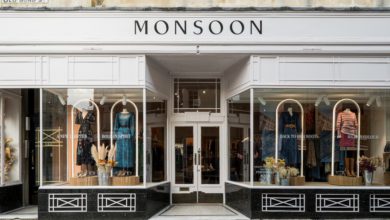The business pledges of the Conservative leadership finalists
As Conservative leadership battle continues, Rishi Sunak and Liz Truss have further expanded on their manifestos to be the next prime minister. One of the most anticipated topics for the next PM is how they are going to address the current rising cost of living for both the public and businesses. So ahead of the final vote in September, Retail Sector has collated both candidates' positions on corporation tax, businesses rates, and inflation below.

Register to get 1 free article
Reveal the article below by registering for our email newsletter.
Want unlimited access? View Plans
Already have an account? Sign in
Business Rates
On 9 August, the Retail Jobs Alliance, a coalition of retailers including Morrisons, Greggs and Tesco, called on both Sunak and Truss to pledge to cut business rates which are charged on most non-domestic properties, such as shops, offices, pubs, warehouses, factories, and holiday rental homes or guest houses. In a letter to the Tory candidates, the alliance said that businesses are facing a 10% increase in rates next spring as inflation is set to climb even higher in the coming months, placing an “unsustainable burden on what is already the most taxed sector in the country”.
It claims a reduction in business rates would create retailers and independent traders an environment in which they can invest in more shops, which are at 14% vacancy according to recent data published by the British Retail Consortium (BRC), as well as create more jobs and opportunities for people.
The former chancellor of the exchequer Rishi Sunak has had rather a lot to say on tax reforms and business rates during the broadcast debates. In response to the alliance’s letter, Sunak vowed on 10 August in a debate at the Darlington Hippodrome theatre that he would slash business rates this autumn if he is elected prime minister, committed to extending the current 50% reduction in his first budget, saying that small retailers are the “beating hearts of all our communities”.
Sunak said: “Particularly those businesses in the hospitality and the retail sector, those on our high streets and our town centres, that is the number one tax they talked to me about when I was chancellor. That’s why in the pandemic I did an enormous amount to help support that industry, because I know how important it is to our communities, the jobs that it provides.
“It’s why this year I cut business rates for those businesses by 50% as chancellor, that’s the biggest tax cut on business rates outside of coronavirus that we’ve ever seen in this country. Because I know that it’s the number one thing that makes a difference this autumn in the budget we’ll do the same.”
Meanwhile, rival Liz Truss, who has served as secretary of state for foreign, commonwealth and development affairs since 2021 and as minister for women and equalities since 2019, has only made a vague pledge to reduce rates. She stated in the live debate that she pledged to reform business rates if she wins the Conservative leadership race.
Corporation tax
Another key worry for many retailers is corporation tax, which is a main tax that a limited company must pay. The tax must be paid both on the company’s profits and on any gains from selling assets, land, property or shares that have increased in value.
Truss has a simple approach, she would scrap next year’s planned rise in corporation tax to 25% from 19%. She also cited Patrick Minford as an economist who approved her approach.
It is interesting to note that Minford, the Cardiff University academic who came to prominence after the Brexit referendum, previously claimed Brexit could generate £135bn in extra income for the UK. However, last year the government’s own independent forecasters at the Office for Budget Responsibility (OBR) assessed it would cost around £80bn in lost income.
The OBR also warned this month that tax cuts “rarely” pay for themselves. It said of Truss and her proposals, that Britain’s public finances were on an “unsustainable” long-term path, with a debt burden that could treble without further tax rises to cover the increasing cost of an ageing population and falling fuel duties.
At the other end of the debate, Sunak became the first chancellor in 47 years to increase corporation tax when he told MPs last year that the headline rate would begin rising over five years from 19% to 25% from April 2023.
Sunak said that the higher rate would generate £47.8bn in extra revenue by April 2026, however, before Boris Johnson’s resignation, he pushed for tax cuts to boost the economy and reportedly favours reversing the planned increase in corporation tax.
Not only did the ex-prime minister raise concerns, the conservative backbenchers have also been pressing Sunak to scrap the change, arguing that such a large tax increase would be ill-judged just as economic growth is set to stagnate, although it is yet clear if he would follow through with the reversal.
Inflation
Spiralling inflation hit 9.4% in July, marking a 40-year high, and it is expected to hit 14% by October. Greg Clark, the newly appointed levelling up secretary, said the next prime minister must overrule “ponderous” civil servants and fast-track decision making to beat rising prices.
In his first interview since taking up the role, Clark told The Daily Telegraph that schemes that get “bogged down in bureaucracy and delay” risk becoming “no longer viable”.
The retail sector will struggle to keep prices fair for customers with increasing inflation, meaning either prices go up, or shops accept lower profits. However, Sunak has pledged to stop inflation from reaching 15% if he gets into Downing Street and said he would make bearing down on inflation his number one priority.
He said: “Conservative members and the public at large rightly want to understand how their next prime minister will navigate the economic headwinds that the country now faces.
“Both of us want to reduce taxes. Both of us recognise that we need a plan for growth. And both of us recognise that, in the short term, we must provide support to those in need on the cost of living. If we rush through premature tax cuts before we have gripped inflation…That would stoke inflation and drive up interest rates, adding to people’s mortgage payments.”
On the other side of the debate, Truss has a somewhat controversial policy. She argued that inflation had been caused by supply chain struggles after the pandemic and the Ukraine war and said that she wanted to review the mandate of the Bank of England, which has a target of maintaining 2% inflation.
Truss said: “The best way of dealing with inflation is monetary policy and what I have said is I want to change the Bank of England’s mandate to make sure in the future it matches some of the most effective central banks in the world at controlling inflation.
“The way to tackle the cost of living crisis is by growing the economy and delivering as much immediate help to people as we can. We cannot tax our way to growth.”
She added: “Delivering bold reforms to the supply side is the way we’ll tackle inflation in the long run and deliver sustainable growth. Modest tax cuts – including scrapping a potentially ruinous corporation tax rise that hasn’t even come into force – are not inflationary.”
With only a few weeks left to go until the new prime minister is voted in and many topics left to be discussed, retail and SME’s can only hope that the person the nation will call prime minister will have a plan for the UKs economy and the independent businesses that rely on fair policies to keep trading. While retail has yet to stake a flag behind either candidate it seems for the British retail Consortium fixing business rates relief should be their main priority. As Helen Dickinson OBE, CEO of the British Retail Consortium explains: “The next prime minister has an opportunity to fix the broken business rates system once and for all. Business rates are a driving factor behind shop closures and retail job losses, with a 2021 BRC survey finding that more than 80% of retailers said they were ‘likely’ or ‘certain’ to have to close shops unless the rates burden is cut.
“While working on a longer-term plan to bring rates to a sustainable level, the next PM should ensure that businesses move to their ‘correct’ rates bill as soon as possible following the 2023 revaluation.”







